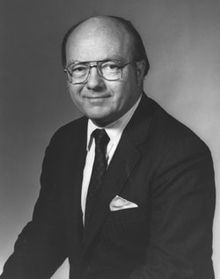Jack F. Matlock Jr. | |
|---|---|
 | |
| United States Ambassador to the Soviet Union | |
| In office April 6, 1987 – August 11, 1991 | |
| President | Ronald Reagan George H. W. Bush |
| Preceded by | Arthur A. Hartman |
| Succeeded by | Robert S. Strauss |
| United States Ambassador to Czechoslovakia | |
| In office September 28, 1981 – September 20, 1983 | |
| President | Ronald Reagan |
| Preceded by | Francis J. Meehan |
| Succeeded by | William H. Luers |
| Personal details | |
| Born | Jack Foust Matlock Jr. October 1, 1929 Greensboro, North Carolina, U.S. |
| Spouses |
|
| Children | 5 |
| Alma mater | Duke University Columbia University |
| Profession | Diplomat, educator, historian, linguist |
Jack Foust Matlock Jr. (born October 1, 1929)[1] is an American former ambassador, career Foreign Service Officer, teacher, historian, and linguist. He was a specialist in Soviet affairs during some of the most tumultuous years of the Cold War, and served as the U.S. ambassador to the Soviet Union from 1987 to 1991.
Matlock became interested in Russia as a Duke University undergraduate, and after studies at Columbia University and a stint as a Russian-language instructor at Dartmouth College, entered the Foreign Service in 1956. His 35-year career encompassed much of the Cold War period between the Soviet Union and the United States. His first assignment to Moscow was in 1961, and it was from the embassy there that he experienced the 1962 Cuban Missile Crisis, helping to translate diplomatic messages between the leaders. The next year he was posted to West Africa, and he later served in East Africa, during the post-colonial period of superpower rivalry.
At the beginning of détente, he was director of Soviet affairs in the State Department, and began to participate in the summit meetings between the leaders, eventually attending all but one of the U.S.–Soviet summits held in the 20-year period 1972–91. Matlock was back in Moscow in 1974, serving in the number two position in the embassy for four years. The Soviet invasion of Afghanistan in early 1980 ended the period of reduced tensions. Matlock was assigned to Moscow again in 1981 as acting ambassador during the first part of Ronald Reagan's presidency. Reagan appointed him as ambassador to Czechoslovakia and later asked him to return to Washington in 1983 to work at the National Security Council, with the assignment to develop a negotiating strategy to end the arms race. When Mikhail Gorbachev became the leader of the Soviet Union in 1985, arms negotiations and summit meetings resumed. Matlock was appointed ambassador to the Soviet Union in 1987 and saw the last years of the Soviet Union before he retired from the Foreign Service in 1991.
After leaving the Foreign Service, he wrote an account of the end of the Soviet Union titled Autopsy on an Empire,[2] followed by an account of the end of the Cold War titled Reagan and Gorbachev: How the Cold War Ended,[3] establishing his reputation as a historian. He joined the faculty of the Institute for Advanced Study and he went on to teach diplomacy at several New England colleges. In 1998, Matlock was elected to the American Philosophical Society.[4] He lives in Princeton, New Jersey.
- ^ Hearings, United States House Committee on Foreign Affairs, 1971.
- ^ Cite error: The named reference
autopsywas invoked but never defined (see the help page). - ^ Cite error: The named reference
reagorwas invoked but never defined (see the help page). - ^ "APS Member History". search.amphilsoc.org. Retrieved 2021-12-03.